Water glassing eggs is an old fashioned way to keep eggs fresh all year long. Learn how to water glass eggs with this step-by-step tutorial.
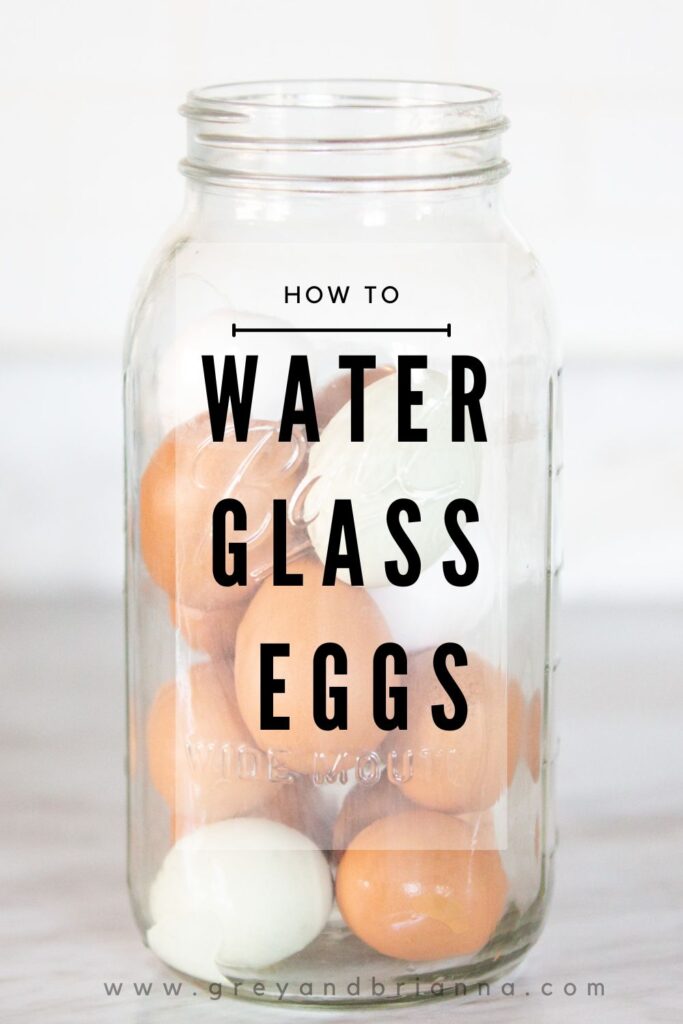
This post contains affiliate links which means I make a small commission at no extra cost to you. See my full disclosure here.
During the Spring months when the chickens are laying at full capacity, we have more eggs than we can eat fresh. Knowing how to save them for the long Winter months when they are not laying is a useful skill.
Many people might not know that eggs are a seasonal food! Unless they are preserved by freeze drying them, or freezing them you might be left without homegrown eggs during the Winter. I also like to make breakfast casseroles, and baked goods that contain eggs and freeze them too, if you were looking for other ideas.
The point is, is that eggs need to be preserved while you have them. Water glassing eggs is the SIMPLEST method for preserving eggs, and has been done for hundreds of years. I am constantly scouring homesteading books to learn new skills to add to my toolbox of food preservation methods. Water glassing eggs is definitely an old fashioned skill that fits into this modern life.
What is water glassing eggs?
Water glassing eggs is simply submerging unwashed (eggs with the bloom still intact), clean of debris eggs in pickling lime and water solution. This will seal off the shell and preserve them for 12-18 months! The result is eggs that are just as fresh as when they were just laid. This method of egg preservation goes back to the 1800s. It is used to keep the abundance of Springtime eggs fresh all year long.
There are a few different ways to water glass eggs, such as sodium silicate and water, but this article explains how to water glass them using pickling lime.
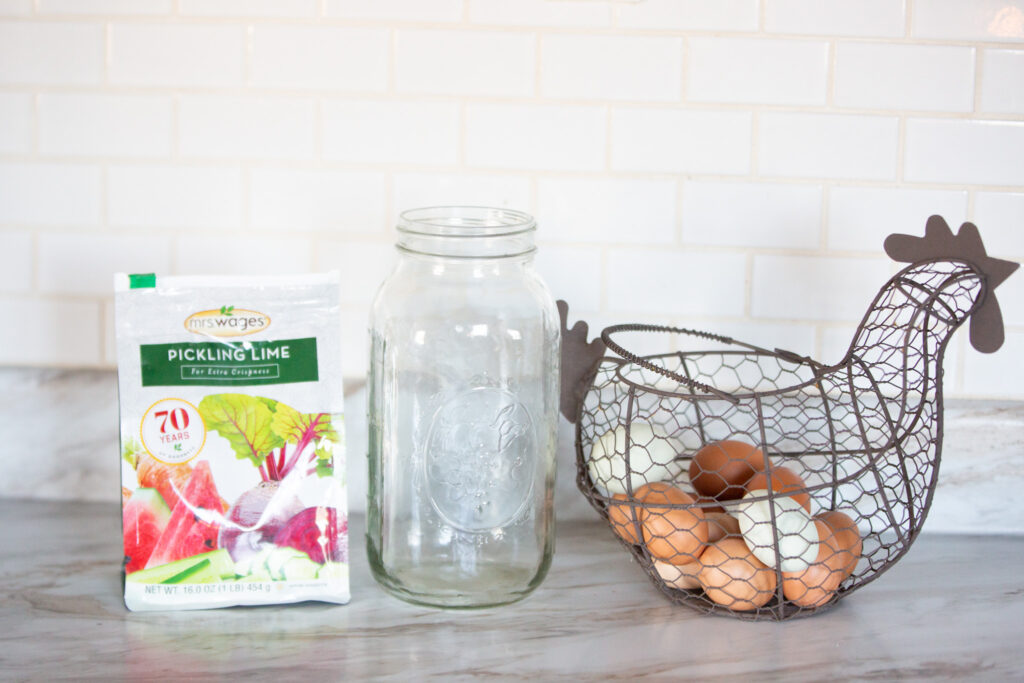
Ingredients you will need:
- 1 ounce pickling lime (here’s the kind we use!)
- 1 quart filtered water
- Clean unwashed eggs (Eggs that have no poop or mud, and the “bloom” still fully intact)
Equipment:
- Airtight Food grade bucket or half gallon glass jar
- Kitchen scale (to weigh the pickling lime)
What types of eggs can you use:
- Chicken Eggs
- Quail Eggs
- Duck Eggs
- Any eggs can we water glassed!
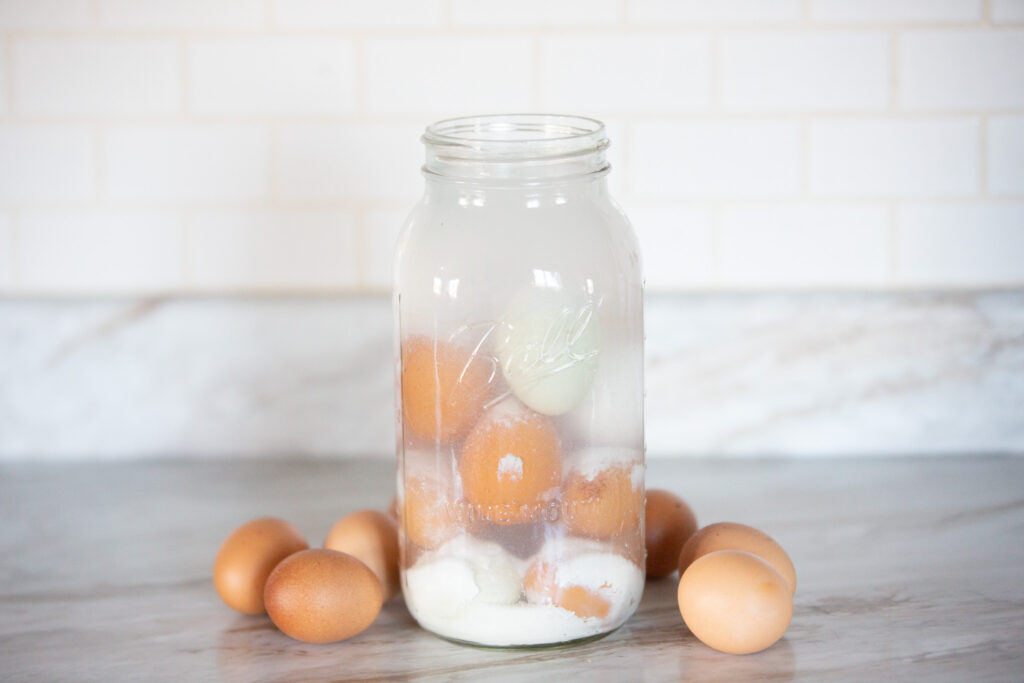
How to water glass eggs
- Measure out 1 ounce of pickling lime on your kitchen scale.
- Add the pickling lime to a clean half gallon jar and fill it up halfway (one quart) with filtered water.
- Whisk the lime into the water until it is fully incorporated.
- Carefully add the eggs pointy side down.
- Add an airtight lid to prevent oxygen from getting in, and prevent the water from evaporating.
- Store the water glassed eggs in a cool dark place.
Will Any Eggs Work for Water Glassing?
Remember that only eggs that still have the bloom intact can be water glassed. Storebought eggs have been washed and cannot be water glassed. Source from your own chickens or a neighbor.

Water glassing eggs tips
- You can fit approximately 16-18 eggs per half gallon jar.
- Use your cleanest eggs for water glassing. Collect the eggs that have no debris to water glass. Keeping clean nesting boxes helps with this!
- Use an airtight vessel. Oxygen is the enemy of nearly all food preservation methods, and water glassing is no exception!
- Use 1 ounce of pickling lime per quart of water. You can do this in any quantity. So if you have 50 dozen eggs, get yourself some big food grade buckets and whole lot of lime!
Does Water Glassing Eggs Really Work?
Yes! This method is tried and true for a reason! It seems a little strange at firstly I know. Especially since in the United States eggs are typically kept and sold from a refrigerator. The lime solution keeps the oxygen from the eggs, which in turn allows them to stay fresh.
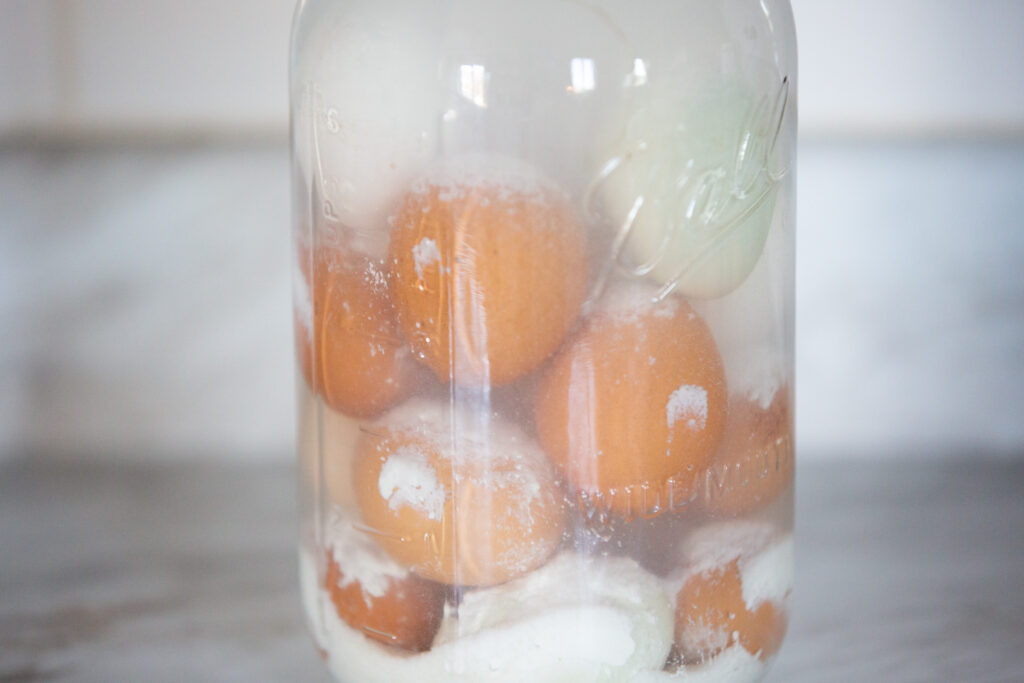
When is the best time to preserve eggs?
There is no ideal time to preserve eggs, however it makes sense to preserve them when you have an abundance of eggs. For us, this is mid-spring once our chicken’s production has really picked up and we’re getting more than what we can eat.
Water glassing eggs frequently asked questions (FAQ)
Should I wear gloves or protection when working with lime water?
Yes, the lime solution is a high ph and can really dry out your hands. You won’t be hurt if you forget gloves, but if you have sensitive skin, wear gloves as a precaution.
How Long Do They Last?
You can store water glassed eggs in a cool dark place for up to a year. Some people have had success for much longer.
What container should I use to water glass eggs?
Eggs can be water glassed in any clean vessel that holds water. If you’ve got a small amount of eggs you can use something as small as a half gallon jar. If you are preserving larger amounts of eggs you can use a food grade bucket, or a ceramic crock.
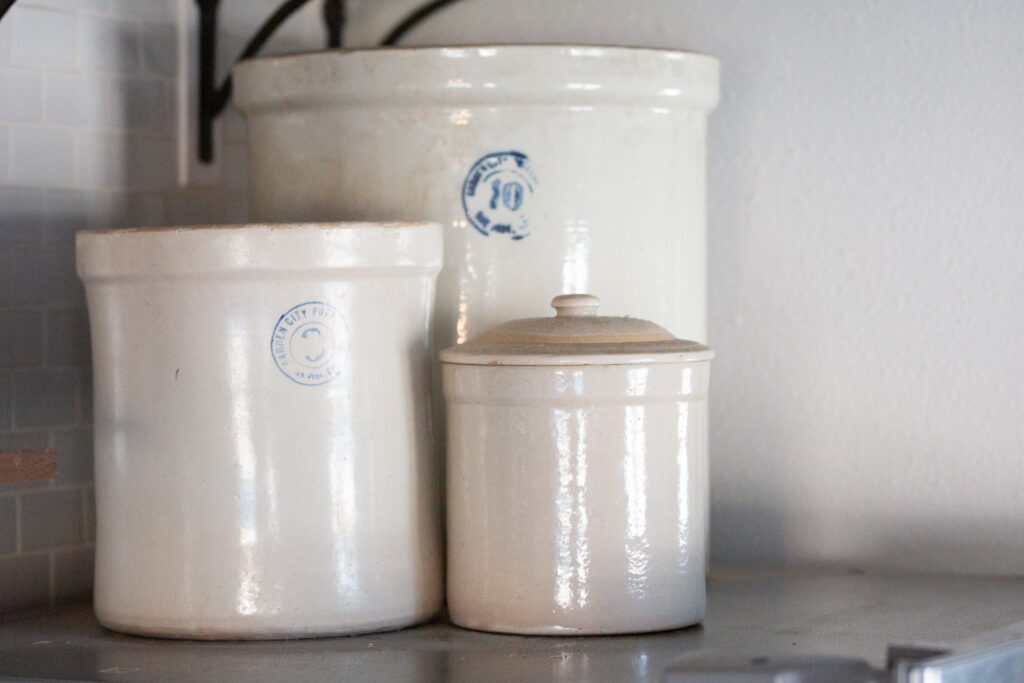
Why should you preserve eggs?
Eggs are a seasonal food! If you are used to buying eggs in the grocery store, you might not know that hens have a laying season where they lay regularly. In the short cold days of Winter, you’ll be left with few or no eggs unless you’ve put some up during the warmer months.
What is Hydrated Lime?
Hydrated lime is usually a combination of oyster shells, bones, and limestone that have been burnt in a kiln, then hydrated with water. That’s it! It’s a very natural product, it’s not synthetic, and it’s completely safe to use.
Can you water glass store bought eggs?
No. You cannot water glass store bought eggs. When hens lay eggs, they are covered with a protective “bloom” that keep the eggs fresh. Eggs from the grocery store have been cleaned and sanitized, so the bloom is no longer intact. The lime solution in water glassing works with the bloom to preserve the eggs. Try freeze drying or freezing eggs if you are saving storebought eggs.
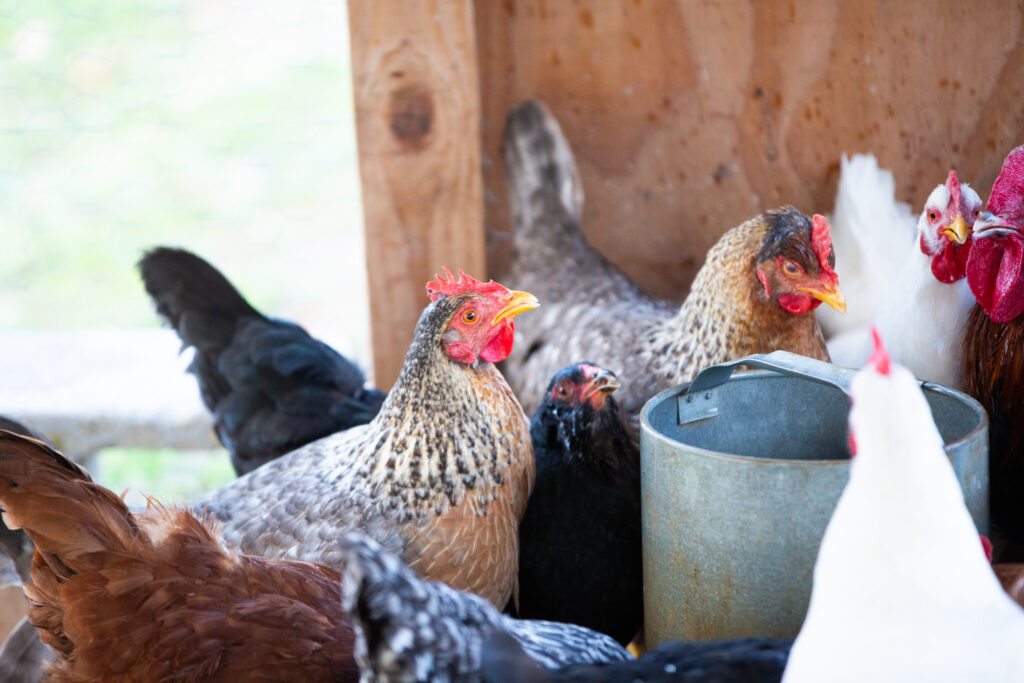
Can you use tap water to water glass eggs?
Avoid chlorinated and fluorinated water when water glassing eggs. Ideally you would have access to filtered water that still has all of the minerals intact. If you are on a well, “tap” water will work just fine. If you are on city water with chlorine and fluoride, consider using a water filter.
Can you boil water glass eggs?
Yes. You can hard boil eggs that have been water glassed, but it is important to note that you should first poke a small hole in the shell. The lime solution seals off the egg, and fills all of the pores of the eggshell, so it could actually explode if you don’t first create a release for the pressure.
What is hydrated lime?
Hydrated lime aka calcium hydroxide is a dry and colorless white powder that is most commonly used in steel manufacturing. It is also known as pickling lime or slaked lime.
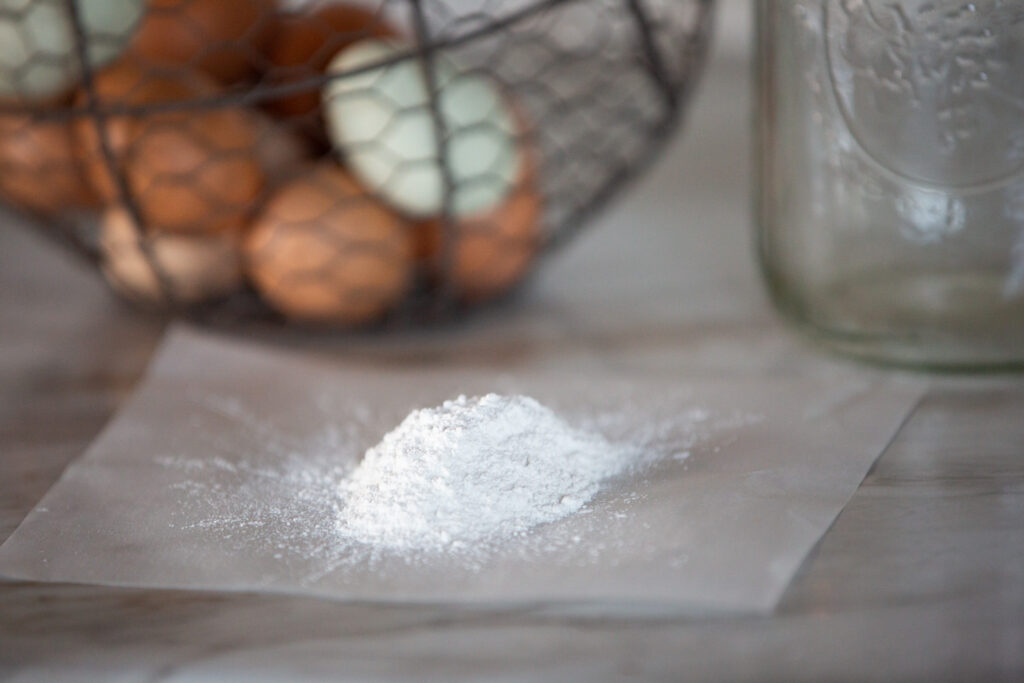
Can I use garden lime for water glassing eggs?
Garden lime is calcium carbonate, whereas pickling lime is calcium hydroxide. Since the hydroxide is more alkaline, pickling lime is recommended for water glassing.
Is it normal for the lime to settle on the bottom?
Yes, settling lime is a normal part of the process. You may be tempted to stir the solution back up, but you don’t need to. You will risk cracking the eggs. There is still plenty of lime in the water to preserve the eggs, even if the lime has settled to the bottom.
Are water glassed eggs safe to eat?
As long as the process was done right, water glassed eggs are perfectly safe. Make sure to use clean jars and utensils and clean (unwashed) eggs. If an egg has gone bad, you will know. The smell will be way off. You can also use the float test (after water glassing) to ensure the egg is still fresh.

Do they taste different than fresh eggs?
No! That is the best part about water glassed eggs. Freezing, dehydrating, and even freeze drying eggs changes the texture of the eggs, whereas water glassing keeps them exactly as they were the day the hen laid them.
When can I preserve farm fresh eggs?
You can water glass eggs anytime! The eggs also don’t need to be harvested fresh that day. You can wait until you have enough clean ones saved up and do a big preserving day. Just do make sure they are still fresh.
You may also like:
How to Freeze Dry Eggs the Right Way
Best Amazon Long Term Food Storage Containers
How to Have Long Term Food Storage
Pantry Inventory List to Boost Food Security
How to Beat Inflation at the Grocery Store
Pin it for later!



We water glassed some eggs last year and are now doing it again. Two questions: 1) seems like you ought to be able to use the solution that was used previously, since the pickling lime solution is a saturated solution and the solid does not decompose or degrade–do you know if it’s ok to reuse the solution? and 2) how do you dispose of the solution and solid? Thanks!
We don’t typically re-use the lime solution, so I cannot speak to that, we start fresh every time. As far as disposing of the lime solution, it is alkaline and so it can go anywhere on your yard/property you do not mind the soil being a little more alkaline. 🙂 I hope this helps!
Waterglassing has worked great for me with fresh eggs from a coworker’s hens! I’ve been using them to scramble (first few months) and bake with. I water glasses about 4 dozen as my first try with it. Now they have been in the lime solution for nearly a year. I realized today I want to use up the rest of this batch and get new ones to waterglass to have over the winter. So the eggs I cracked this morning are very liquid, like water – the yolk dissipated into the watery white when I cracked it. I have lost my sense of smell, so I can’t tell if it smells off. Just wanted to know if this is a natural change when they’ve been wateglassed for this long? I am quite sure they are good – they sank in the water when I put them in a jar to rinse the lime off. I’m just not 100% about the bloom… if there was one spot on the egg where bloom had rubbed off, would lime leech into the egg inside? Or would the egg just crack and be obvious to remove from the batch? I’d love to hear your feedback!
Unless the egg looks fresh, as in right from the hen. I would avoid using the eggs that even look off, because if any of the bloom was not in tact this method wouldn’t work well. I typically do not store water glassed eggs longer than about 8-9 months because that is all we need to get through the slow season of the chickens laying. I hope that this helps!
I just opened my 2 gallon bucket of water glassed eggs and the container had a slight off smell and two eggs had a cracker in them and they were floating. Does this mean the whole container is bad or can I just transfer the remaking eggs into a clean container with new solution?